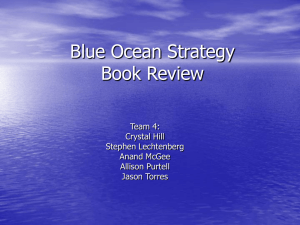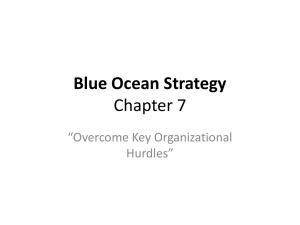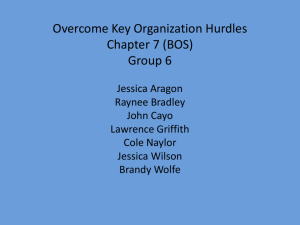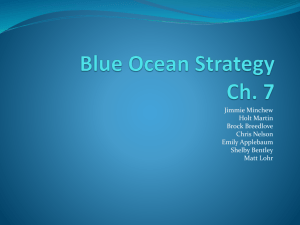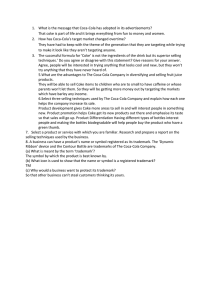O K H VERCOME
advertisement
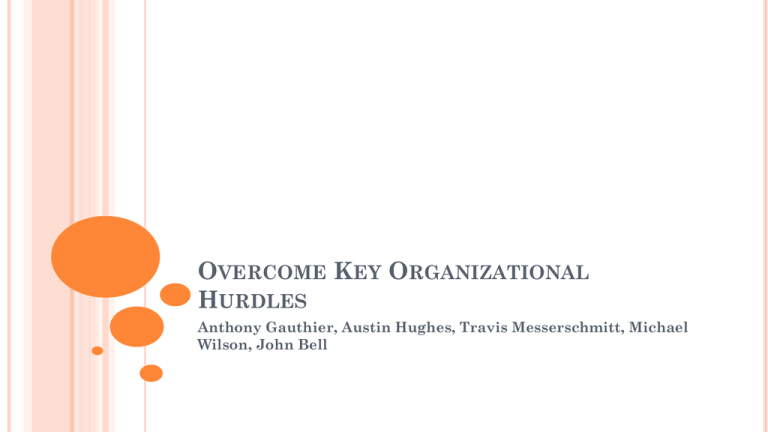
OVERCOME KEY ORGANIZATIONAL HURDLES Anthony Gauthier, Austin Hughes, Travis Messerschmitt, Michael Wilson, John Bell RELEVANCE IN THE SOFT DRINK INDUSTRY The soft drink industry has seen hard times in the past few years. Fallout from 2005 when the demand for healthier products gained traction has come to haunt big players. Letter to the Shareholders 2015 Coca Cola “And the plain and simple truth is that capturing this opportunity for you and our Company will require us to perform at a higher level than we did in 2014.” The need to create a blue ocean is impending… EXECUTION OF BLUE OCEAN STRATEGY A significant departure from the status quo… Four Hurdles: 1) Cognitive 2) Limited Resources 3) Motivation 4) Politics 5TH PRINCIPAL OF BLUE OCEAN STRATEGY “Overcome key organizational hurdles to make blue ocean strategy happen in action.” Flip conventional wisdom on its head by using… TIPPING POINT LEADERSHIP Overcome hurdles fast and at low cost with employee backing for a break from the status quo. The effects of successful tipping point leadership… Ex: Bill Bratton and the NYPD No increase in budget but felony crime down 39%, murder rate down 50%, theft down 35%. Changes have outlasted Bratton, fundamental shift in the organization implied. THE PIVOTAL LEVER Fundamental changes can happen quickly when beliefs and energies of critical mass create a movement towards an idea. The key to the movement is concentration. BREAK THROUGH THE COGNITIVE HURDLE CEOS ACHIEVING BETTER RESULTS Many CEOs simply look at the numbers and raise the standards based on performance Coke is growing in the opposite direction and changed their marketing campaign as a result ISSUES ASSOCIATED WITH HIGHER STANDARDS Salespeople wanting better commission will falsify numbers Hostility and suspicion grow in correlation with goal stretching EXPERIENCE CHANGES Companies don’t change simply because of numbers, but must experience positive or negative impacts to reinforce or change behavior. This can be done in one of 2 ways RIDE THE “ELECTRIC SEWER” Originating from public fear of riding on the subway in New York during the 1990’s the new police chief fixed perception of being afraid of taking the subway by riding on it himself daily Statistically the subway had only 3% of major crimes that occurred in the city and was safer than most other major metropolitan areas RIDE THE “ELECTRIC SEWER” CONT. Top level management typically falls back on numbers to feign ignorance New Coke fell back on blind taste tests to prove that the new drink tasted better MEET WITH DISGRUNTLED CUSTOMERS Top level can’t afford to simply experience what customers are going through, they must also talk to customers about specifics With New Coke it tasted better, however all the data couldn’t show the emotional attachment to the brand of Classic Coke JUMPING THE RESOURCE HURDLE Multiply the value of the resources you have Three disproportionate influences a company can leverage to free resources Hot Spots, Cold Spots, and Horse Trading Hot spots Low resource input and high potential performance gains Coca Cola overcame a huge analytics problem by unifying its distribution centers under one analytics system JUMPING RESOURCE HURDLES CONTINUED… Avoid Cold Spots (high resource input, low performance impact) Horse Trading Trading excess resources in one area for another to fill resource gaps Allocate resources so they are used efficiently Coca-Cola Water Stewardship Reallocated money from Diet Coke to create seed funds for Water Stewardship Project NYPD TRANSIT STRATEGY CANVAS Resource Allocation RESOURCE ALLOCATION Focused on hot spots, such as high crime areas, and quality-of-life crimes De-emphasized cold spots, such as widespread patrol of subways and officer involvement in processing arrests. COCA-COLA RESOURCE ALLOCATION Coca-Cola recently reallocated resources. Ways that they allocated resources away from cold spots include job reductions and selling bottling factories. They targeted hot-spots such as resale margins and package sizes. They increased prices and promoted smaller packing sizes. MOTIVATIONAL HURDLE The mass of employees must be motivated to implement a blue ocean strategy. To motivate employees, managers focus on three factors of disproportionate influence: kingpins, fishbowl management, and atomization. KINGPINS “Kingpin” refers to the key influencers in an organization, like a kingpin in bowling. This frees the top-level leaders to focus less on each individual. These natural leaders will persuade and motivate those that follow them. PLACE KINGPINS IN A FISHBOWL Putting the kingpins in the fishbowl puts attention of others on them. This both motivates them to perform well and raises the stakes of inaction. Those that lag behind are noticed and those that perform well are noticed and rewarded. ATOMIZE THE CHALLENGE A strategic challenge MUST be achievable for people to believe they can do it. Break it down Nestle wanted to be “World Leader in Nutrition” Created Nestle Health Sciences In-Depth Research Acquired Healthy Companies in line with their research KNOCK OVER THE POLITICAL HURDLE Inescapable. Must defeat it. Leverage Angels Silence Devils Get a consigliere on your team LEVERAGE ANGELS & SILENCE DEVILS Who stands to gain the most by shift? Who naturally aligns with me? Build a strong coalition with them early! Who stands to lose the most? Build up resistance against them before it’s a problem. Know their likely attacks CONSIGLIERE Member of upper management team Often forgotten Have the inside scoop Like a cheat code in minesweeper
